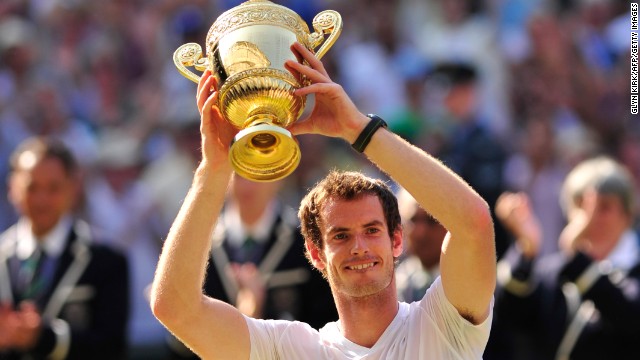
(CNN) -- You can be forgiven for losing track of time the morning after a night 77 years in the making.
"Oh sorry, that's my alarm," says an apologetic Andy Murray as his alarm trills while being interviewed. "That was the finals day time for getting up, 915am ... just for yesterday."
Yesterday was Sunday July 7 and the day which saw Murray secure his place in British sporting history.
In the 24 hours between those two alarms going off, Murray's world irrevocably changed with his 6-4 7-5 6-4 win over over Novak Djokovic in straight sets ensuring he became Britain's first men's singles champion at Wimbledon since 1936.
Read: Murray wins Wimbledon
It had been the most energy-sapping three sets of his career, with the world No. 2 eventually beating the world No. 1 following three hours of brutal battle, but Murray didn't want to go to sleep.
After waiting his entire career to win the title Britain had so much wanted over nearly eight decades, the Scot was scared of waking up to discover it was all a dream.
"That's the one worry you have when you go to bed," Murray told CNN after becoming the first male British singles champion at Wimbledon since Fred Perry.
"You wake up and it's actually not true, so I was obviously very happy and relieved that I had done it."
Blog: Murray grasps opportunity to make history
Twelve months ago Murray had sobbed on Centre Court after losing his first Wimbledon final to Roger Federer.
Redemption came a month later on the same court against the same opponent, only with a different outcome.
The Scot won to clinch Olympic gold at London 2012 and the hearts of a jubilant British public began to soften towards a man that had arguably come up short in the popularity stakes when compared to another British tennis star -- the now retired -- Tim Henman.
In September a first grand slam title promptly followed at the U.S. Open, as Murray beat Djokovic in five sets in New York.
"Last year was the toughest loss of my career," explained the 26-year-old Murray when asked about his defeat in last year's Wimbledon final. "It was the first time I responded well from a grand slam defeat and the Olympics helped.
"That period after the Wimbledon final and the Olympics was probably the most important of my career because it could have gone the other way. I could have not recovered from it and it could have been a struggle but I worked hard.
"I said after the semifinal that Wimbledon is the pinnacle of the sport," added Murray, referring to his comments after his last four win over Jerzy Janowicz.
"To do it with all of the pressure and stuff was really tough, it took a lot out of me. I'm just glad I don't have to worry about it anymore."
Weight of expectation
Murray might have been worrying, but so to has the British public. Worrying about a Briton winning Wimbledon has been a national pastime.
He is the country's sole male tennis star and his annual quest for grass-court glory grips millions of anxious fans.
While the shouts of encouragement inside Centre Court can work in Murray's favor, the media interest and the weight of expectation can also be a monkey on his back.
"During the match you try to embrace the pressures, the emotions and the struggle you're going through out there," said Murray.
"You have to embrace the occasion, but it's not necessarily enjoyment. You enjoy the winning and the outcome. If you lose, you're incredibly disappointed."
It looked as if the pressure might just be too much for Murray in what proved to be the deciding game of an absorbing final.
Murray, calm and composed, was 40-0 up with three championship points.
Ever the competitor, Djokovic showed the spirit and skill which has led him to six grand slam titles by hitting back.
A nation held its breath.
"In that moment it must have been hard for people to watch," admitted Murray, who saved three break points before Djokovic found the net and the celebrations kicked off.
"Last night I just saw the last game, it was tough to watch even though I knew the outcome," said the Scot.
After such a momentous triumph, it is tempting to suggest Murray can rest on his laurels.
But the man from Dunblane has more grand slams in his sights, starting with a return to the Big Apple at the end of August.
"For me it's been to gradual improve throughout my career," he answers. "Year upon year just getting a little bit better and change a few things.
"I will have a rest now and get myself ready to defend the U.S. Open. It will be my first time trying to defend a grand slam title so it will be a new pressure for me, a new experience and I look forward to it."
He better keep that alarm on.
Via: Perfect timing: Murray wakes Britain from 77-year slumber
No comments:
Post a Comment